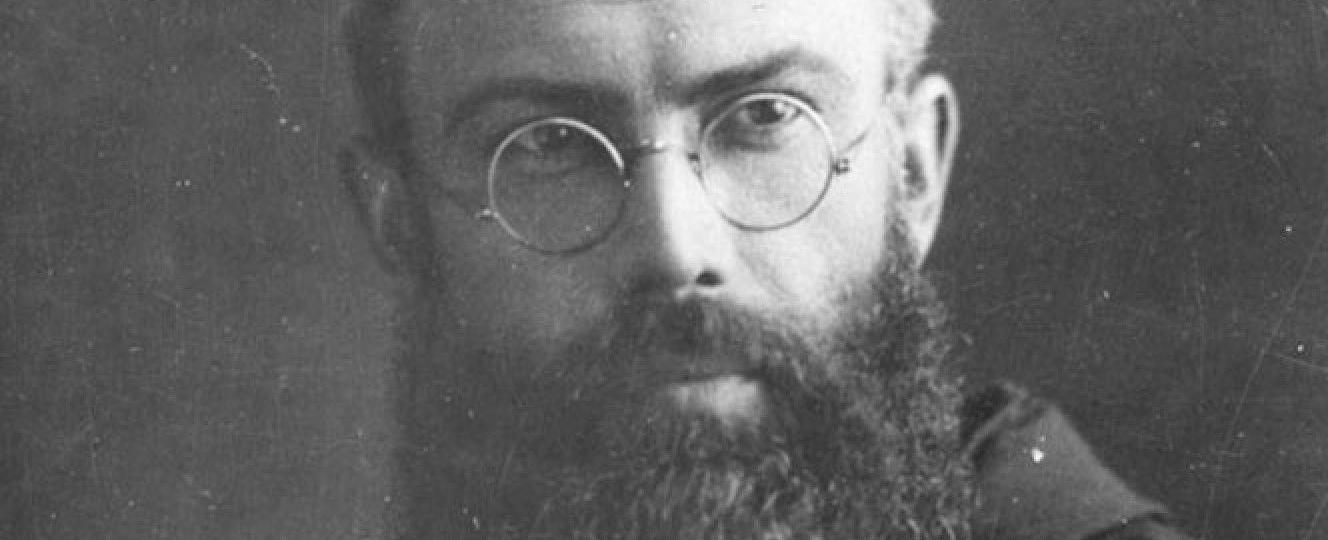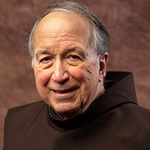Maximilian Kolbe

76 years ago, August 14, 1941, Fr. Maximilian Kolbe OFM. Conv., was killed with a phenol injection inside a starvation cell of Block 11 of the Nazi concentration camp at Auschwitz.
Kolbe was born in 1894 at Zdunska Wola near Lodz, Poland (then part of the Russian Empire) to a devout but poor family. As a teenager, he determined to become a Franciscan and so illegally crossed the border into the Austro-Hungarian Empire where he studied at the Conventual minor seminary in Lvov and entered the Order in 1910. Friar Maximilian was a brilliant student who excelled in what we would call today STEM subjects; after his profession, he was sent on for studies in Rome, where he earned doctorates in both philosophy and theology.
 During his years in Italy, he witnessed violent anti-clerical demonstrations and became convinced of the need to mobilize Catholics to profess their faith in today’s world; he organized the Militia of the Immaculate, whose members would consecrate themselves to Mary to work for the conversion of sinners and those opposed to the Church. When Kolbe returned to Poland in 1919, he embarked on whirlwind of activities to advance his Militia, founding a monthly magazine that quickly became very popular. He founded the monastery of Niepokalanow ("City of the Immaculate") near Warsaw (Kolbe's room pictured on left), which by the late 1930's housed a self-sustaining Franciscan community of over 700 members, operating a minor seminary and putting out a variety of publications.
During his years in Italy, he witnessed violent anti-clerical demonstrations and became convinced of the need to mobilize Catholics to profess their faith in today’s world; he organized the Militia of the Immaculate, whose members would consecrate themselves to Mary to work for the conversion of sinners and those opposed to the Church. When Kolbe returned to Poland in 1919, he embarked on whirlwind of activities to advance his Militia, founding a monthly magazine that quickly became very popular. He founded the monastery of Niepokalanow ("City of the Immaculate") near Warsaw (Kolbe's room pictured on left), which by the late 1930's housed a self-sustaining Franciscan community of over 700 members, operating a minor seminary and putting out a variety of publications.
When Poland was occupied at the beginning of World War II, the monastery, which was housing a large number of refugees, including many Jews, fell under suspicion by the Nazis. In 1941, Kolbe was arrested by the Gestapo and deported to Auschwitz. In July, a man from his barracks escaped: in retaliation, the commandant selected 10 prisoners to be starved to death. One of these, a young officer, cried out in concern for his wife and children. Maximilian stepped forward to take his place and so was consigned to the starvation bunker, where two weeks later he was finally killed by lethal injection. Fr. Maximilian was canonized by Pope John Paul II in 1982, who called him "a martyr of charity."
including many Jews, fell under suspicion by the Nazis. In 1941, Kolbe was arrested by the Gestapo and deported to Auschwitz. In July, a man from his barracks escaped: in retaliation, the commandant selected 10 prisoners to be starved to death. One of these, a young officer, cried out in concern for his wife and children. Maximilian stepped forward to take his place and so was consigned to the starvation bunker, where two weeks later he was finally killed by lethal injection. Fr. Maximilian was canonized by Pope John Paul II in 1982, who called him "a martyr of charity."
Some quotations from St. Maximilian's writings:
" Let us remember that love lives through sacrifice and is nourished by giving...Without sacrifice there is no love."
"For a book from which to learn how to grow in the love of God, there is no better book than Jesus Christ crucified."
"For Jesus Christ, I am prepared to suffer even more."
"By dedicating ourselves to the Immaculate Virgin we become in her hands instruments of God's mercy even as she was such an instrument in God's hands. We should let ourselves be guided and led by Mary and rest quiet and secure in her hands."
Kolbe was born in 1894 at Zdunska Wola near Lodz, Poland (then part of the Russian Empire) to a devout but poor family. As a teenager, he determined to become a Franciscan and so illegally crossed the border into the Austro-Hungarian Empire where he studied at the Conventual minor seminary in Lvov and entered the Order in 1910. Friar Maximilian was a brilliant student who excelled in what we would call today STEM subjects; after his profession, he was sent on for studies in Rome, where he earned doctorates in both philosophy and theology.
 During his years in Italy, he witnessed violent anti-clerical demonstrations and became convinced of the need to mobilize Catholics to profess their faith in today’s world; he organized the Militia of the Immaculate, whose members would consecrate themselves to Mary to work for the conversion of sinners and those opposed to the Church. When Kolbe returned to Poland in 1919, he embarked on whirlwind of activities to advance his Militia, founding a monthly magazine that quickly became very popular. He founded the monastery of Niepokalanow ("City of the Immaculate") near Warsaw (Kolbe's room pictured on left), which by the late 1930's housed a self-sustaining Franciscan community of over 700 members, operating a minor seminary and putting out a variety of publications.
During his years in Italy, he witnessed violent anti-clerical demonstrations and became convinced of the need to mobilize Catholics to profess their faith in today’s world; he organized the Militia of the Immaculate, whose members would consecrate themselves to Mary to work for the conversion of sinners and those opposed to the Church. When Kolbe returned to Poland in 1919, he embarked on whirlwind of activities to advance his Militia, founding a monthly magazine that quickly became very popular. He founded the monastery of Niepokalanow ("City of the Immaculate") near Warsaw (Kolbe's room pictured on left), which by the late 1930's housed a self-sustaining Franciscan community of over 700 members, operating a minor seminary and putting out a variety of publications. When Poland was occupied at the beginning of World War II, the monastery, which was housing a large number of refugees,
 including many Jews, fell under suspicion by the Nazis. In 1941, Kolbe was arrested by the Gestapo and deported to Auschwitz. In July, a man from his barracks escaped: in retaliation, the commandant selected 10 prisoners to be starved to death. One of these, a young officer, cried out in concern for his wife and children. Maximilian stepped forward to take his place and so was consigned to the starvation bunker, where two weeks later he was finally killed by lethal injection. Fr. Maximilian was canonized by Pope John Paul II in 1982, who called him "a martyr of charity."
including many Jews, fell under suspicion by the Nazis. In 1941, Kolbe was arrested by the Gestapo and deported to Auschwitz. In July, a man from his barracks escaped: in retaliation, the commandant selected 10 prisoners to be starved to death. One of these, a young officer, cried out in concern for his wife and children. Maximilian stepped forward to take his place and so was consigned to the starvation bunker, where two weeks later he was finally killed by lethal injection. Fr. Maximilian was canonized by Pope John Paul II in 1982, who called him "a martyr of charity."Some quotations from St. Maximilian's writings:
" Let us remember that love lives through sacrifice and is nourished by giving...Without sacrifice there is no love."
"For a book from which to learn how to grow in the love of God, there is no better book than Jesus Christ crucified."
"For Jesus Christ, I am prepared to suffer even more."
"By dedicating ourselves to the Immaculate Virgin we become in her hands instruments of God's mercy even as she was such an instrument in God's hands. We should let ourselves be guided and led by Mary and rest quiet and secure in her hands."
Dominic Monti, OFM
Professor of Franciscan Research in the Franciscan Institute of St. Bonaventure University
Dominic V. Monti, OFM, is a Franciscan Friar of Holy Name Province (USA) and currently professor of Franciscan Research in the Franciscan Institute of St. Bonaventure University. He devoted the greater part of his ministry to teaching the History of Christianity, in particular the history of the Franciscan movement. He has contributed two volumes to the Works of St. Bonaventure series and is author of Francis & His Brothers, a popular history of the Friars Minor.

